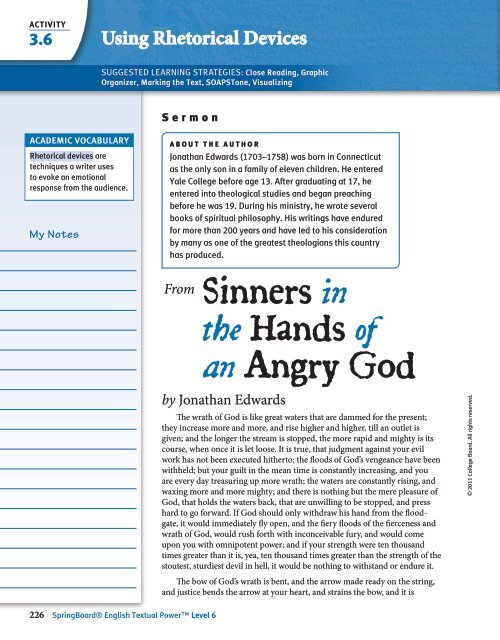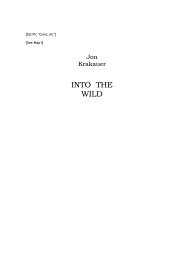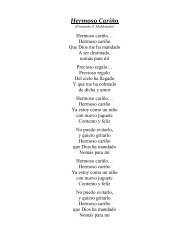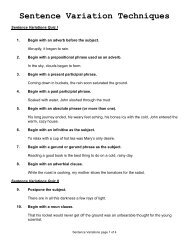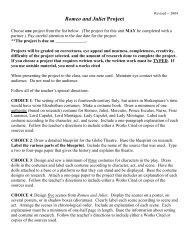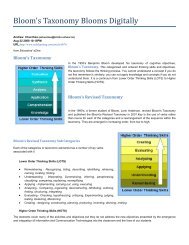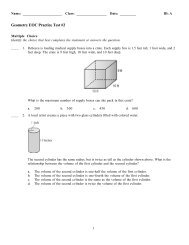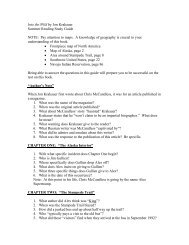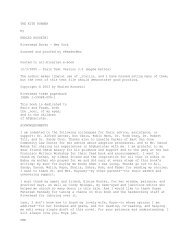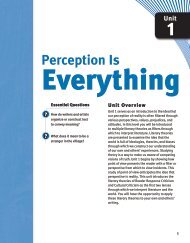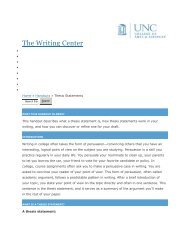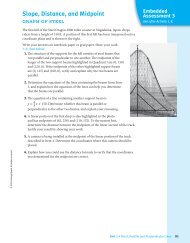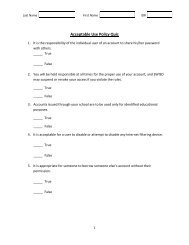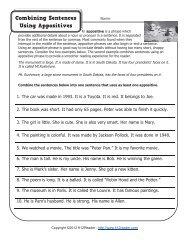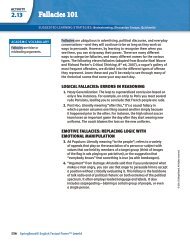Using Rhetorical Devices
Using Rhetorical Devices
Using Rhetorical Devices
Create successful ePaper yourself
Turn your PDF publications into a flip-book with our unique Google optimized e-Paper software.
Activity<br />
3.6<br />
<strong>Using</strong> <strong>Rhetorical</strong> <strong>Devices</strong><br />
SUGGESTED Learning Strategies: Close Reading, Graphic<br />
Organizer, Marking the Text, SOAPSTone, Visualizing<br />
S e r m o n<br />
Academic VocaBulary<br />
<strong>Rhetorical</strong> devices are<br />
techniques a writer uses<br />
to evoke an emotional<br />
response from the audience.<br />
My Notes<br />
A b o u t t h e A u t h o r<br />
Jonathan Edwards (1703–1758) was born in Connecticut<br />
as the only son in a family of eleven children. He entered<br />
Yale College before age 13. After graduating at 17, he<br />
entered into theological studies and began preaching<br />
before he was 19. During his ministry, he wrote several<br />
books of spiritual philosophy. His writings have endured<br />
for more than 200 years and have led to his consideration<br />
by many as one of the greatest theologians this country<br />
has produced.<br />
From<br />
<br />
by Jonathan Edwards<br />
The wrath of God is like great waters that are dammed for the present;<br />
they increase more and more, and rise higher and higher, till an outlet is<br />
given; and the longer the stream is stopped, the more rapid and mighty is its<br />
course, when once it is let loose. It is true, that judgment against your evil<br />
work has not been executed hitherto; the floods of God’s vengeance have been<br />
withheld; but your guilt in the mean time is constantly increasing, and you<br />
are every day treasuring up more wrath; the waters are constantly rising, and<br />
waxing more and more mighty; and there is nothing but the mere pleasure of<br />
God, that holds the waters back, that are unwilling to be stopped, and press<br />
hard to go forward. If God should only withdraw his hand from the floodgate,<br />
it would immediately fly open, and the fiery floods of the fierceness and<br />
wrath of God, would rush forth with inconceivable fury, and would come<br />
upon you with omnipotent power; and if your strength were ten thousand<br />
times greater than it is, yea, ten thousand times greater than the strength of the<br />
stoutest, sturdiest devil in hell, it would be nothing to withstand or endure it.<br />
The bow of God’s wrath is bent, and the arrow made ready on the string,<br />
and justice bends the arrow at your heart, and strains the bow, and it is<br />
© 2011 College Board. All rights reserved.<br />
226 SpringBoard® English Textual Power Level 6
Activity 3.6<br />
continued<br />
© 2011 College Board. All rights reserved.<br />
nothing but the mere pleasure of God, and that of an angry God, without any<br />
promise or obligation at all, that keeps the arrow one moment from being<br />
made drunk with your blood.<br />
Thus are all you that never passed under a great change of heart by the<br />
mighty power of the Spirit of God upon your souls; all you that were never<br />
born again, and made new creatures, and raised from being dead in sin, to<br />
a state of new, and before altogether unexperienced light and life, are in the<br />
hands of an angry God. However you may have reformed your life in many<br />
things, and may have had religious affections, and may keep up a form of<br />
religion in your families and closets, and in the house of God, and may be<br />
strict in it, you are thus in the hands of an angry God; it is nothing but his<br />
mere pleasure that keeps you from being this moment swallowed up in<br />
everlasting destruction.<br />
However unconvinced you may now be of the truth of what you hear, by<br />
and by you will be fully convinced of it. Those that are gone from being in the<br />
like circumstances with you, see that it was so with them; for destruction came<br />
suddenly upon most of them; when they expected nothing of it, and while they<br />
were saying, Peace and safety: now they see, that those things on which they<br />
depended for peace and safety, were nothing but thin air and empty shadows.<br />
The God that holds you over the pit of hell, much as one holds a spider, or<br />
some loathsome insect over the fire, abhors you, and is dreadfully provoked:<br />
his wrath towards you burns like fire; he looks upon you as worthy of nothing<br />
else, but to be cast into the fire; he is of purer eyes than to bear to have you<br />
in his sight; you are ten thousand times more abominable in his eyes, than<br />
the most hateful and venomous serpent is in ours. You have offended him<br />
infinitely more than ever a stubborn rebel did his prince; and yet it is nothing<br />
but his hand that holds you from falling into the fire every moment. It is to<br />
be ascribed to nothing else, that you did not go to hell the last night; that you<br />
was suffered to awake again in this world after you closed your eyes to sleep.<br />
And there is no other reason to be given, why you have not dropped into hell<br />
since you arose in the morning, but that God’s hand has held you up. There<br />
is no other reason to be given why you have not gone to hell, since you have<br />
sat here in the house of God, provoking his pure eyes by your sinful wicked<br />
manner of attending his solemn worship. Yea, there is nothing else that is to<br />
be given as a reason why you do not this very moment drop down into hell.<br />
O sinner! Consider the fearful danger you are in: it is a great furnace<br />
of wrath, a wide and bottomless pit, full of the fire of wrath, that you are<br />
held over in the hand of that God, whose wrath is provoked and incensed<br />
as much against you as against many of the damned in hell. You hang by a<br />
slender thread, with the fames of divine wrath flashing about it, and ready<br />
every moment to singe it and burn it asunder; and you have no interest in<br />
any Mediator, and nothing to lay hold of to save yourself, nothing to keep off<br />
the flames of wrath, nothing of your own, nothing that you ever have done,<br />
nothing that you can do, to induce God to spare you one moment….<br />
Literary terms<br />
Argument by analogy is a<br />
comparison of two similar<br />
situations, implying that<br />
the outcome of one will<br />
resemble the outcome of the<br />
other.<br />
An extended metaphor is<br />
a comparison that extends<br />
over several lines or an<br />
entire poem.<br />
Repetition is the use of<br />
any element of language —<br />
sound, word, phrase —more<br />
than once.<br />
My Notes<br />
unit 3 • The Power of Persuasion 227
Activity 3.6<br />
continued<br />
<strong>Using</strong> <strong>Rhetorical</strong> <strong>Devices</strong><br />
The following graphic organizer presents the definitions of some common<br />
rhetorical devices used in speeches (examples are from Kennedy’s Inaugural<br />
Address). Identify other examples of these devices in the speeches of Jonathan<br />
Edwards and Patrick Henry. Explain the effect of the device.<br />
<strong>Rhetorical</strong> Device and Example Other Examples Effect<br />
Repetition (anaphora): Repetition at the<br />
beginnings of clauses, lines, or sentences.<br />
(In Chunks 3-8, Kennedy repeats “To<br />
those…”)<br />
Aphorism: A concise statement of truth.<br />
(In Chunk 15, Kennedy requests, “And so,<br />
my fellow Americans: ask not what your<br />
country can do for you—ask what you can<br />
do for your country.”)<br />
Parallelism: The use of repeated<br />
grammatical structures. (In Chunk 2 “…we<br />
shall pay any price, bear any burden, meet<br />
any hardship…”)<br />
Allusion: A direct or indirect reference to<br />
something from history, the Bible, etc.<br />
(In Chunk 10, the direct reference to the<br />
Book of Isaiah)<br />
<strong>Rhetorical</strong> Question: A question for which<br />
the answer is obvious. (In Chunk 14,<br />
Kennedy asks, “Can we forge against<br />
these enemies a grand and global alliance,<br />
North and South, East and West, that<br />
can assure a more fruitful life for all<br />
mankind?”)<br />
Argument by Analogy: A comparison of<br />
two similar situations, implying that the<br />
outcome of one will resemble the outcome<br />
of the other. (In Chunk 4, “those who<br />
foolishly sought power by riding the back<br />
of the tiger ended up inside.” )<br />
© 2011 College Board. All rights reserved.<br />
Metaphor and Simile: Comparisons of<br />
two unlike things. (In Chunk 11: “And if a<br />
beachhead of cooperation may push back<br />
the jungle of suspicion…”)<br />
228 SpringBoard® English Textual Power Level 6


